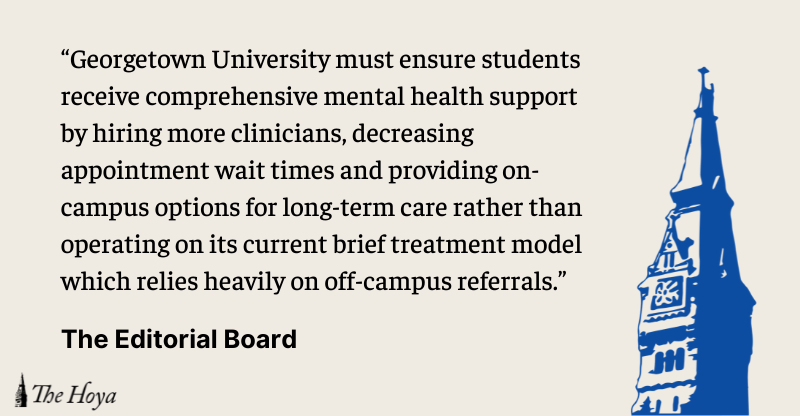As students navigate Georgetown University’s rigorous academic environment, readjust to in-person social life and cope with the grief and isolation of the COVID-19 pandemic, quality mental health care is imperative for maintaining students’ wellness.
Georgetown must ensure students receive comprehensive mental health support by hiring more clinicians, decreasing appointment wait times and providing on-campus options for long-term care rather than operating on its current brief treatment model which relies heavily on off-campus referrals.
Recent research shows students’ mental health suffered during the COVID-19 pandemic.
One study from the Journal of Medical Internet Research found college students have experienced increased stress, anxiety and depressive thoughts amid pandemic related isolation. The American Psychological Association reports that many students are experiencing similar symptoms as they transition from Zoom screens to traditional classrooms.
Additionally, Georgetown’s lack of access to mental health resources will disproportionately impact LGBT students and students of color.
In Georgetown’s first cultural climate survey conducted in February 2020, students who identified as Black, Asian, Latinx, Hispanic and multiracial reported significantly lower levels of cultural belonging and support than their white peers. According to research published in the Journal of Adolescent Health, students who identify as LGBT also require more support than their heterosexual and cisgender counterparts because of unsafe or unaccepting families and environments.
With already existing disparities in responses to the cultural climate survey, it is now more important than ever to ensure that every student can find a support system regardless of their personal background.
Not only are Georgetown students continuing to manage mental health challenges stemming from profound loss brought about by the pandemic, but they also have to face the immense academic and social pressures of the first in-person semester in over a year. With much of the undergraduate student body having little to no experience living and learning on a college campus, younger Georgetown community members are particularly vulnerable to mental health concerns since many have yet to establish personal support systems.
Currently, Georgetown’s Counseling and Psychiatric Services (CAPS) refers students seeking long-term care to off-campus providers after an initial meeting with a clinician, posing barriers to students who cannot afford therapy on their own. CAPS argues this model allows for efficiency in meeting the demand they receive, but some students believe that the scheduling system fails to provide accessible service in a timely manner.
Counseling services are severely delayed, and multiple students have experienced extended hold times and week- to monthlong waitlists, according to Georgetown University Student Association Accessibility Coordinator Gwyneth Murphy (SFS ’23).
“With things like CAPS when you have students’ lives in your hands, not just in an abstract way, but in a real way where a missed 45-minute hold on a call line could be someone’s life, change has to move faster than the politics and the red tape,” Murphy said in an interview with The Hoya.
In response to student concerns, the university maintains that it is taking steps to support student well-being.
“We are committed to supporting Georgetown’s students as they live meaningful lives, confident in their mental health and wellbeing,” a university spokesperson wrote in an email to The Hoya. “We are actively growing our CAPS team to meet the increased demand for services since the return to in-person learning. We’ve hired four new staff members already; they will focus on providing direct clinical services to students.”
The spokesperson also noted that some of the new hires have expertise working with students of color, immigrant, refugees and survivors of sexual assault. These efforts will hopefully address the disparity in sense of belonging between white students and students of color at Georgetown.
Hiring more staff members with this expertise is undeniably a key step in providing the care tat students need, but it is unclear if the addition of four new staff members will alleviate the extended wait times, especially considering CAPS’ permanent director position has been vacant since May 2021.
Georgetown has provided several email communications publicizing mental health services for faculty, staff and students, but the resources available clearly need drastic improvements.
The newly established online resource center, Every Hoya Cares, consolidates information on how to access mental health resources, but it is still difficult to consider it a successful tool for students when Georgetown’s main on-campus mental health resource is difficult to access and does not offer the long-term care many seek.
Making available long-term, readily accessible mental health care is crucial to promoting student wellness, according to Maggie Lin (COL ’24), who supports increased on-campus mental health resources.
“Struggling with mental issues isn’t an easy thing to talk about,” Lin said in an interview with The Hoya. “Georgetown allocating more resources would indicate to students that their mental health is a priority, which encourages students who might be reluctant to talk about their mental health in the first place to seek help and utilize those resources.”
Being a college student can be a stressful, exhausting and isolating experience, and it is critical that Georgetown prioritize student health and ensure there are adequate resources to provide care for every single student who needs it when they need it.
The Hoya’s Editorial Board is composed of six students and is chaired by the Opinion editors. Editorials reflect only the beliefs of a majority of the board and are not representative of The Hoya or any individual member of the board.





















khurshed alam • Sep 26, 2021 at 2:00 am
In reaction to pupil concerns, the college continues that it’s far taking steps to guide scholar well-being.
Thank you.